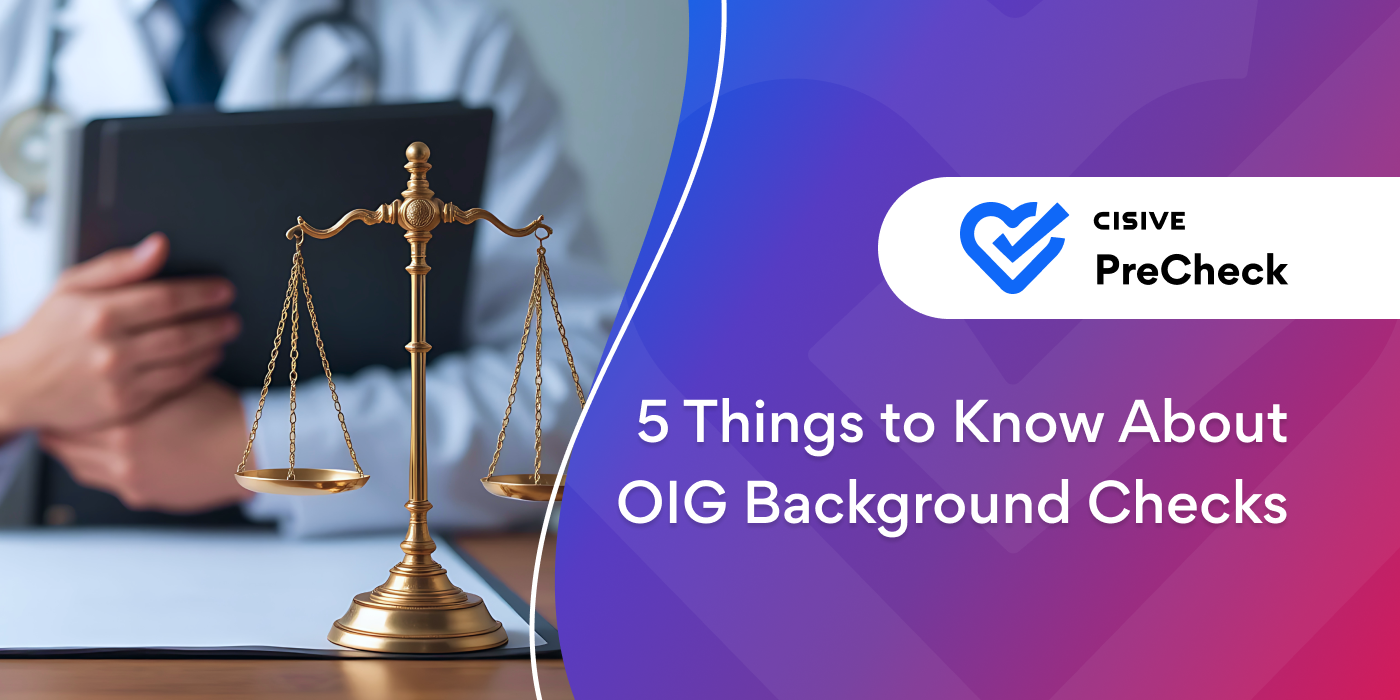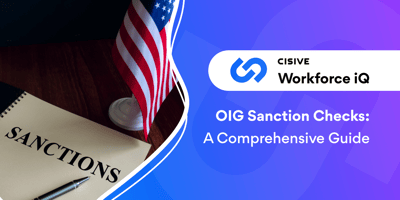

In the complex world of healthcare, OIG sanction checks are non-negotiable. These checks are far...

Between finding the right candidates and navigating complex regulations, hiring in the healthcare sector can feel like a major balancing act. One misstep, and you may face costly fines, reputational damage, or even legal consequences.
That’s where the Office of Inspector General (OIG) background checks come in. These checks determine whether someone is legally allowed to work with federal healthcare programs. They’re a crucial part of protecting your organization’s patients, funding, and reputation.
In this blog post, we’ll break down what OIG background checks are, who they apply to, and how often they’re required. Then, we’ll discuss how your organization can stay federally compliant with help from trusted partners like Cisive’s PreCheck.
Key TakeawaysHere are the key things you need to know about OIG background checks:
|
An OIG background check compares the name of your candidate against the List of Excluded Individuals and Entities (LEIE). It’s also called an OIG sanction check.
This list is maintained by the Office of Inspector General (OIG), a division of the U.S. Department of Health and Human Services. Anyone listed on the LEIE is barred from participating in federally funded healthcare programs. Because these programs include Medicare and Medicaid, an OIG background check is an important step in your screening.
An OIG check verifies that hiring the applicant won’t result in a loss of federal funding eligibility for your organization. As an added benefit, it can help you avoid hiring an applicant with a known history of fraud or abuse.
Employers who fail to run OIG screening on employees and contractors may face significant fines and penalties. Think of OIG checks as proactive safeguards that ensure your workforce remains compliant with federal laws.
It’s not just physicians or nurses who require OIG background checks. Anyone employed by, or who works with, federal healthcare programs may be subject to OIG screening. This can include people in non-clinical roles, too.
The following positions typically undergo OIG background checks:
Physicians and physician assistants
Registered nurses (RNs) and licensed practical nurses (LPNs)
Certified nursing assistants (CNAs) and home health aides
Physical therapists
Social workers
Medical assistants
Pharmacists and pharmacy technicians
Emergency medical technicians (EMTs) and paramedics
Ambulance drivers and dispatch personnel
Hospital and nursing home staff
Independent contractors and third-party vendors
Claims processors and billing agents
Medical device sales representatives
Board members
Volunteers
The OIG exclusion list is officially the List of Excluded Individuals and Entities (LEIE). The LEIE is a publicly accessible database that lists individuals and organizations barred from participating in federally funded healthcare programs. This ban can be due to fraud, patient abuse, license revocations, or other violations.
Hiring someone on this list — whether or not you knew they were on it — can result in serious consequences for your organization. You could incur steep fines or penalties. Even worse, it could result in a loss of federal funding eligibility. To avoid this, do what you can to avoid penalties with OIG exclusion screening.
If a person or organization is convicted of a serious offense, they will be put on the LEIE. In fact, for specific offenses, the Social Security Act requires the OIG to exclude people from participating in healthcare programs that are federally funded. Convictions that require mandatory exclusion include:
Patient abuse or neglect
Financial exploitation of a patient
Medicare or Medicaid fraud
Children’s Health Insurance Program (CHIP) or state healthcare program fraud
Felony convictions for other healthcare-related fraud, theft, or financial misconduct
Felony convictions for the illegal handling of controlled substances
Healthcare employers must ensure these individuals are not on staff or under contract, even in non-clinical roles.
The above violations require mandatory exclusion, but lesser violations may also result in exclusion. While still serious, these permissive offenses don’t automatically lead to exclusion; instead, the OIG has discretion to determine whether exclusion is appropriate based on the situation.
Common grounds for permissive exclusion include:
Misdemeanor convictions related to healthcare fraud, including false or fraudulent claims
Misdemeanor convictions for the illegal handling of controlled substances
Suspension or revocation of a healthcare license
Providing unnecessary or substandard services
Engaging in unlawful kickback arrangements
Defaulting on health education loan payments
Controlling a sanctioned entity as an owner, officer, or managing employee

Conducting OIG background screening isn’t just best practice; it’s a legal requirement. However, how you conduct these checks is also regulated. Several federal laws shape the screening process and protect candidates’ rights. Understand these regulations if you are running background checks.
The Americans with Disabilities Act (ADA) prohibits employers from discriminating against individuals based on disabilities. It also places strict limitations on medical-related questions and exam requirements during the hiring process.
When conducting OIG background checks, you’re prohibited from asking for medical information from candidates. You can only ask certain questions once a conditional offer of employment has been made.
OIG background checks only assess a candidate's legal eligibility to work in a healthcare program. It does not involve their physical or mental health status. Even if someone claims they’re on the exclusion list due to medical issues, the ADA does not cover them. You can still take adverse action.
The OIG prohibits individuals or entities from participating in federally funded healthcare programs if they’ve violated specific federal laws. Section 1128 of the federal Social Security Act is what gives the OIG this authority.
The full list of violations that cause prohibition is also part of the Social Security Act. These violations include healthcare fraud, abuse, or misconduct.
The Social Security Act also mandates that healthcare providers and organizations do not employ or contract with excluded individuals. It doesn’t matter whether they’re directly involved in patient care; if they’re on the list, they’re excluded.
Employers are not legally required by the Social Security Act to conduct an OIG background check. However, running one is an essential safeguard. Employers who knowingly or unknowingly hire excluded individuals may be held strictly liable and can face penalties.
The FCRA protects candidates when third-party background checks are used in employment decisions. Does your organization partner with a screening provider like Cisive’s PreCheck to conduct OIG background checks? If so, you must also follow these FCRA requirements:
Inform candidates in writing that a background check is being conducted.
Obtain their written consent.
Provide a copy of the report and a summary of rights if you intend to take adverse action based on the findings.
Failing to follow FCRA requirements can result in lawsuits and fines, in addition to OIG-related penalties.
While there’s no federal law dictating how often OIG background checks should be done, the OIG updates its exclusion list on a monthly basis. Therefore, it’s best practice to screen all employees, contractors, and vendors once a month.
The industry standard is to conduct an initial screening before employment and again at the time of hire. However, it’s very possible for an employee to become excluded after their start date. Without regular checks, you may remain unaware of this fact and potentially put your organization at risk.
Some employers rely on manual searches, since you’re just checking a list. But this method is time-consuming and prone to error. It can be even more time-consuming if you’re also checking license statuses or state-level exclusion lists.
Automated, ongoing monitoring supported by a screening partner offers peace of mind and helps protect your organization.
PreCheck, powered by Cisive, is a background screening software specializing in healthcare compliance. Our solutions help organizations simplify LEIE screening and avoid compliance pitfalls.
With PreCheck, employers can:
Automate OIG exclusion checks and get alerts when a match is found.
Consolidate multiple exclusion database checks (including state-level lists) into one report.
Maintain records of all screenings for internal and regulatory review.
Our services are designed with healthcare-specific compliance needs in mind, reducing administrative burden while increasing accuracy and reliability.
OIG background checks are essential for high-performing healthcare organizations. Unfortunately, managing them can be overwhelming. That’s where PreCheck has you covered. We help you handle everything, from accessing the exclusion list to navigating federal regulations.
With automated, ongoing monitoring from PreCheck, you can reduce risk and streamline your background check processes. That gives you more time to focus on what matters most: delivering exceptional care.
Need help with OIG background checks or ongoing compliance monitoring? Contact PreCheck to learn more.

In the complex world of healthcare, OIG sanction checks are non-negotiable. These checks are far...

Hiring for home-based care isn’t like staffing a hospital floor or an outpatient clinic. When a...

As an organization in the healthcare industry, remaining in compliance with the rules and...